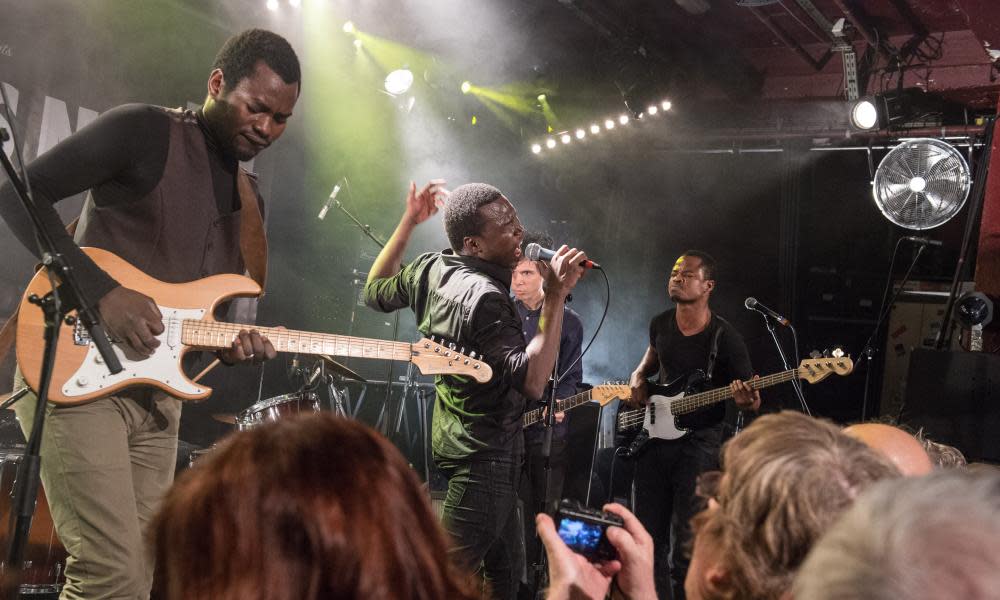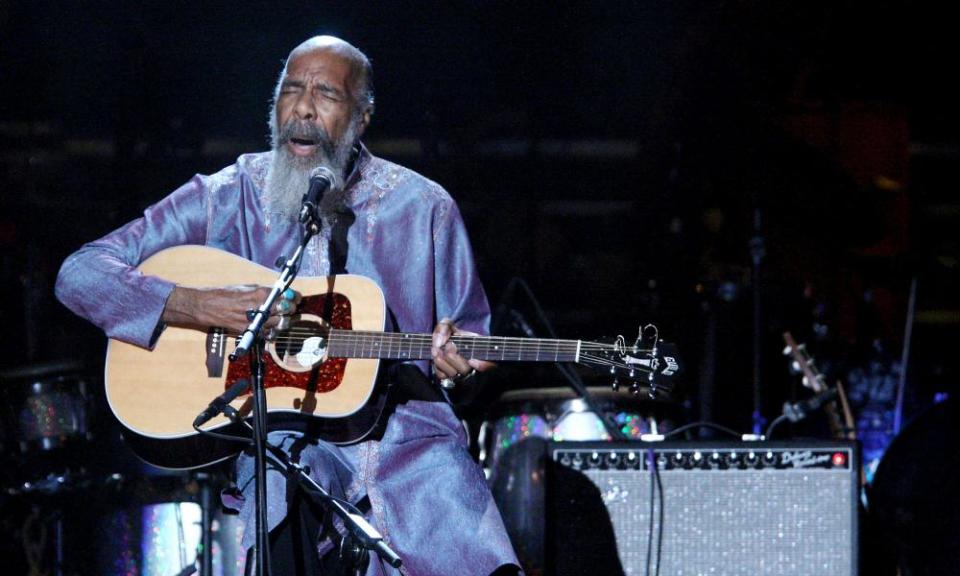Readers recommend playlist: your live versions

Here is this week’s playlist – songs picked by a reader from hundreds of suggestions in the comments on last week’s callout. Read more about how our weekly series works at the end of the piece.
In Spain, they say duende. Originally the word denoted a sprite or goblin, but is now used to signify the olé moment, when the spirit enters the performer, uniting audience and artist as one. That’s the deal with live music: it transports us from the humdrum, and as we leave the daily grind behind we feel something inside. Unbridled joy, spiritual contact, emotional release: call it what you will, but we have all felt it. As we begin our playlist, watch Javier Limón’s eyes express the privilege he feels playing his guitar alongside Concha Buika as she sings Oro Santo.
Through history, wherever music was made, audiences gathered. It was originally a ritual, encompassing social interaction, spirituality and pleasure in its purest form. In this next case we’re taken to Congo’s Kinshasa, where music, body language and a few beers combine to lift people out of themselves. Sobanza Mimanisa’s Kiwembo illustrates how and why music is such a crucial aspect of our humanity.
As each musician hears or imagines a sequence of notes they want to play, music evolves and rarely sounds the same twice – personality and circumstance act as filters, but the audience itself also hears the output differently. Sometimes all this is a deliberate process, as with Grateful Dead, who here take Otis Redding’s Hard to Handle and run with it.
Occasionally someone invents a form without antecedent. For this to happen there has to be a sea change of social, intellectual and artistic consciousness, whether artificially induced or not. Pink Floyd’s asks the audience to explore an interior landscape populated by stray thoughts, frayed nerves, surging emotions and a collective heartbeat.
Sometimes that beat is all that’s needed, but still musicians need to add a garnish. In Molly Hatchet’s Dreams I’ll Never See, a reworking of the Allman Brothers’ original, in this playlist caught live at the Reading Festival in 1979, there’s intermittent extraneous noise picked up, but that just serves to demonstrate how our pleasure centres compensate for our ears in live situations and focus on the stage.
And so to one of the most iconic stagings of all time: Woodstock, 1969. Richie Havens had played the New York clubs with Bob Dylan, Joan Rivers and many others; he’d been around the block. Now, opening the world’s largest ever music festival, which was running late from the get-go – they were still building the stage around him during his set, and upcoming acts were stuck in traffic – legend has it he heard instructions from backstage: “Keep playing!” “I can’t, I’ve done my set.” “Keep playing, Richie, we’re not ready.”
So he made up a song. On the spot. Sure there were elements of blues and gospel, but he put them together spontaneously, rocked it up and won a place in history. Richie Havens, a trouper, gave us Freedom.

Just as Havens scoured his heritage, so did Alvin Lee of Ten Years After for their I’m Going Home, performed on the same stage. The theme may seem trite, but musicians on the road long for home. Transporting the audience, Lee established himself as a major force in rock music here.
Staying with rock and blues, Rory Gallagher was up there with the greats. His version of William Harris’s Bullfrog Blues is a classic example of controlled audience ecstacy – the nominated version played in front of a French crowd in 1980. It’s doubtful whether Harris would have recognised his own tune, but it served as a template for Gallagher to whip up a frenzy.
Andy Kershaw once played John Lee Hooker an Ali Farka Touré track. “That’s the blues,” John Lee said. Then he reversed the process, playing Ali a John Lee song. “That’s Malian,” said Ali. If you ever wondered where the blues came from, it’s Mali, and it’s still coming, as Songhoy Blues’ Soubour amply demonstrates.
Bordered by Libya, Eritrea, Ethiopia, Egypt, South Sudan, Chad, the Central African Republic and the Red Sea, and bisected by the river Nile, Sudan is an obvious melting pot of cultures and sounds. In Sudan, people rely on live music for their entertainment, CDs and cassettes tend to be expensively poor copies, and are unlikely to be prioritised by the locals. Abdel Aziz El Mubarak is exactly the type of performer people travel miles to experience – here’s his Ya A’Asaal.
Betty Wright’s Clean Up Woman, about a woman who’ll steal your man if you upset him, went gold in 1971 for the teenager with a vocal gift, sense of humour and sheer cheek. Much later Wright caressed and tortured cheering audiences with spookily accurate impressions of then current superstars: all of them, male and female, cleaning up, so to speak.
In the nominated version of Christian Scott’s Twin, musicians weave magic among the books and files, racks and desks of a library – quite the gig location. We’ve almost come full circle, but now it’s a different kind of intimacy, one where you can feel the warm breath of the flutist and the gasp of the trumpeter.
We close with Neil Young’s Birds: a man, a song, a voice, a piano, all melding to express the sorrow of finality. It’s over. A different thought, a different evocation for each listener.
New theme: how to join in
The new theme will be announced at 8pm (BST) on Thursday 24 August. You have until 11pm on Monday 28 August to submit nominations.
Here is a reminder of some of the guidelines for readers recommend:
If you have a good idea for a theme, or you would like to volunteer to compile a playlist from readers’ suggestions and write a blog about it, please email matthew.holmes@theguardian.com.
There is a wealth of data on RR, including the songs that are “zedded”, at the Marconium. It also tells you the meaning of “zedded”, “donds” and other strange words used by RR regulars.
Many RR regulars also congregate at the ’Spill blog.

 Yahoo News
Yahoo News 
